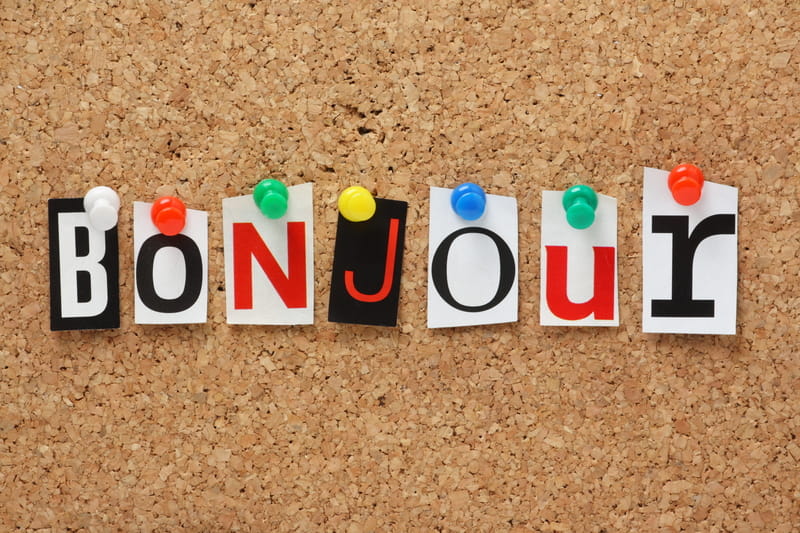French greetings vary widely, depending on the time of day, context, and your relationship with the person. On top of the array of phrases a French speaker may begin a conversation with, there’s also the infamous cheek-kissing to contend with. From polite conversations with your boss, to answering the phone, to writing formal emails, to holiday greetings and saying a customary goodbye in French, there are a lot of options to choose from!
How can you be sure to be ready with the appropriate response?
- Use this breakdown of greetings based on the occasion.
- Become familiar with French pronunciation and vocabulary using Lingvist’s French course so you can recognize what someone says and respond correctly.
- Don’t be afraid to use “Pardon?” if you get stuck.
Formality Guide
| Category | Situation/Context | Examples |
|---|---|---|
| Formal | Used with people you are meeting for the first time, are older than you, or that you want to demonstrate respect for (think vous) | Professors, in-laws, the CEO of your company, the elderly |
| Slightly formal | Used with those you don’t know personally or you want to demonstrate respect for (still vous) | Shopkeepers, bank tellers, your boss, family members you don’t see often |
| Informal | Used when meeting new peers; with friends/acquaintances, classmates, colleagues (half vous, half tu) | Your friend’s friends, family members |
| Very informal | Used in social settings such as bars or sports teams with those you already know (tu all the way) | Close friends and family members close in age |
| Neutral | Appropriate in all settings | Anyone |
Initial Greetings
Below are the most common ways in which an interaction with a French speaker is likely to begin. These will come in handy for travelers in French-speaking countries or to encourage French speakers to use basic French expressions with you. Have your montre (watch) handy, as these expressions are time-sensitive (as in the time of day).
| French | English equivalent | Literal translation | Context | Formality |
|---|---|---|---|---|
| Bonjour | Hello | Good day | Mornings (until 12:00 p.m. noon) | Neutral |
| Bon matin | Good morning | Only in Quebec | Neutral | |
| Bon après-midi | Good afternoon | Only in Quebec | Neutral | |
| Salut | Hi | Informal | ||
| Coucou | Hey | Cutesy greeting for close friends | Very informal | |
| Bonsoir | Good evening/night | Good evening | After 5/6:00 PM | Slightly formal |
| Rebonjour | Hello again | If you’ve already greeted someone and see them a bit later (e.g., passing on the street) | Neutral |
Introductions and Welcome
If this is your first time meeting someone, you’ll need to know how to respond to these expressions!
Introductions:
To ask your name, a French speaker will say: Comment vous appelez-vous? (formal) or Comment tu t’appelles? (informal).
Reply with: Je m’appelle [first name].
| French | English equivalent | Literal translation | Context | Formality |
|---|---|---|---|---|
| Comment vous appelez-vous ? | What’s your name? | How do you (second person singular formal) call yourself? | Introductions | Formal |
| Comment tu t’appelles ? | What’s your name? | How do you (second person singular) call yourself? | Introductions | Informal |
| Je suis très heureux(/euse) de faire votre connaissance | I’m pleased to meet you | I’m very happy to meet you | Introductions | Neutral |
| Très heureux | Nice to meet you | Very happy | Introductions (usually after an initial introduction has taken place, not as a conversation opener) | Slightly informal |
| Enchanté(e) | It’s a pleasure | Charmed | Slightly formal | |
| Enchanté(e) de faire votre connaissance | Pleasure to meet you | Pleasure to make your acquaintance | Formal | |
| Bienvenue | Welcome | “Good coming:” from a combination of “bien” + “venue” (venir) | Introductions | Neutral |
Secondary Greeting / Checking In
After you’ve given some form of salutation, it’s polite to ask how someone is doing. Bypassing this can be perceived as rude. You’ll notice that phrases for checking in with someone use the verb aller (to go) rather than être (to be).
| French | English equivalent | Literal translation | Context | Formality |
|---|---|---|---|---|
| Comment allez-vous ? | How are you (all)? | How are you (all) going? | Can be used as formal or for a group. | Neutral |
| Comment vas-tu ? | How are you? | If someone has used tu with you, feel free to use this instead of vous. | Slightly informal | |
| Comment ça va ? | How’s it going? | How it goes? | Slightly informal | |
| Vous allez bien ? | Are you well? | Are you going well? | For example, checking up on a friend you haven’t seen in a while. | Slightly informal |
| Ça va ? | How’s it going? | It goes? | More informal, definitely for people you knew previously. | Informal |
| Comment vous sentez-vous ?/Comment tu te sens ? | How are you feeling? | If you knew someone was feeling sick, this is a polite way to check up on them. | Neutral | |
| Quoi de neuf ? | What’s new? | Informal | ||
| Ça gaze ? | How’s it hangin’? | A little antiquated but still a fun way to check in with friends. | Very Informal | |
| Quoi de beau ? | What’s up? | What’s beautiful? | Very Informal | |
| Ça roule ? | What’s up? | It’s rolling? | Very Informal | |
| Ça baigne ? | What’s up? | It bathes? | Very Informal |

Faire la bise
If you’re in a situation where you are using one of these secondary greetings, chances are you are meeting someone with whom you will have more continued contact (rather than a quick “Bonjour” to a shopkeeper), and it may be customary to give an “air kiss” on the cheek. If you’re male, in some places you may just shake hands with other males and “kiss” females on each cheek in greeting, but in many places males also font la bise. Females generally give “kisses” (“bises”) to everyone. The amount of bises, as well as which cheek, varies heavily depending on the region of France (and context), so it’s always best to wait for someone else to initiate and follow their lead. This may inevitably lead to starting on the wrong side and coming very close to kissing on the mouth, but don’t worry, it happens to everyone! Just slow down, don’t get flustered, and you’ll be okay.
Options for Replying to a Secondary Greeting
When asked how you are, the most common responses are Ça va bien (“It’s going well”) or Tout va bien (“Everything’s going well”). Just as in English, it is uncommon to reply with Ça va mal (it’s going badly), even if you aren’t 100%. You can use something like comme-ci comme-ça (“like this, like that”) to reply that things are “so-so” and could be better. Once you get comfortable with this, try out these more creative responses!
| French | English equivalent | Literal translation | Context | Formality |
|---|---|---|---|---|
| Bien, merci ! | Good, thanks! | Neutral | ||
| Très bien, merci. | Very well, thanks. | Neutral | ||
| Ça va. | I’m good. | It goes. | Especially when asked (Comment) ça va ? | Neutral |
| Ça roule. | Going well. | It rolls. | Informal | |
| Comme-ci, comme ça. | It’s going alright. | Like this, like that. | If things are just okay | Slightly informal |
| Pas mal. | Not bad. | More vague, but acceptable | Neutral | |
| Pas pire. | No worse than usual. | No worse. | More common in Quebec | Neutral |
| Comme d’hab. | Same as always. | Like usual. | Shortened of comme d’habitude | Slightly Informal |
| Assez bien. | Quite well. | Well enough. | Still a positive response | Neutral |
| Ça va bien. | It’s going well. | It goes well. | Neutral | |
| Tout va bien. | Everything’s going well. | Neutral |
Departing
Heading out? Use these expressions to signal your departure or wish someone farewell. Note that the time-of-day expressions change form (become feminine) when wishing someone farewell.
| French | English equivalent | Literal translation | Context | Formality |
|---|---|---|---|---|
| Au revoir | Goodbye | Until we see each other again | Customary to say au revoir more often than in English, as in when leaving buses, small shops, etc. | Neutral |
| Salut | Bye | Slightly informal | ||
| À plus (tard) | See you later | Until later | When you know you’ll see someone later | Neutral |
| Bonne journée | Have a nice day | Good day | Also appropriate to say when leaving public places like hair salons | Neutral |
| Bon après-midi | Have a good afternoon | Good afternoon | After 12:00 PM | Neutral |
| Bonne soirée | Have a good evening | Good evening | After sunset (5/6:00 PM) | Neutral |
| Bonne nuit | Good night | Good night | Used to signal you’re leaving for the night or going to sleep | Neutral |
Answering the Phone
Once you’ve successfully given someone your number in French (hint: the numbers are grouped differently in French), what do you say when you pick up the phone? Don’t worry – this one should be easy enough to remember: Allô?
Written Letters or Emails
| French | English equivalent | Literal translation | Context | Formality |
|---|---|---|---|---|
| Monsieur/ Madame | Dear Sir/Madam, | Formal | ||
| Chers amis | Dear friends | Slightly informal | ||
| Cher Monsieur/ Chère Madame | Dear Sir/ Madame) | With those you know | Slightly informal | |
| Amitiés | Best, | Slightly formal | ||
| Cordialement (à vous) | Sincerely, | Cordially (yours) | Formal | |
| Chaleureusement | Warmly, | Slightly formal |
Holiday Greetings
| French | English equivalent | Literal translation | Context | Formality |
|---|---|---|---|---|
| Bon/Joyeux anniversaire! | Happy Birthday! | Neutral | ||
| Joyeuses fêtes! | Happy Holidays! | In December | Neutral | |
| Joyeux noël! | Merry Christmas! | Joyful Christmas! | In December | Neutral |
| Bonne année! | Happy New Year! | On Dec. 31 – Jan. 1 | Neutral |
Congratulations! You’ve got the beginning and end of the conversation covered. What about the middle? Check out Lingvist’s French course to learn the rest!


